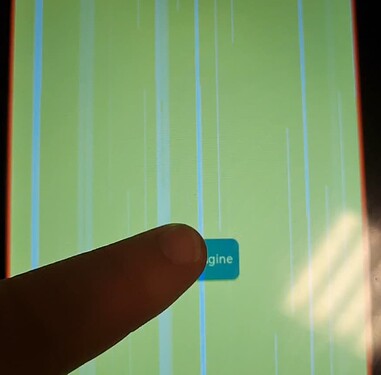Environment
-
What MCU/Processor/Board are you using?
Waveshare esp32-s3-touch-lcd-7 -
What compiler are you using?
compiler: xtensa-gcc-esp32se-elf-g++
framwork: arduino
ide: platformio on visual studio code
Description
-
What version of LittlevGL are you using?
9.2.0 -
What do you want to achieve?
I want to load and view bmp or jpg images from SD -
What have you tried so far?
I’m able to achieve the goal but during the loading and decondig bmp/jpg, I see glitches. When the image is displayed, the problem ceases.
Code to reproduce
The code block(s) should be formatted like:
#include <Arduino.h>
#include <lvgl.h>
#include <ESP_IOExpander_Library.h>
#include <CH422G.h>
#include <FS.h>
#include <SD.h>
#include <SPI.h>
#include "ui/ui.h"
#include "ui/ui_event.h"
#include "ui/screens.h"
#include <ST7262.h>
#include "sd_helper.h"
// Extend IO Pin define
#define TP_RST 1
#define LCD_BL 2
#define LCD_RST 3
#define SD_CS 4
#define USB_SEL 5
// I2C Pin define
#define I2C_MASTER_NUM 0
#define I2C_MASTER_SDA_IO 8
#define I2C_MASTER_SCL_IO 9
#define SD_MOSI 11
#define SD_CLK 12
#define SD_MISO 13
#define SD_SS -1
// Dichiarazione pannello RGB
LGFX *panel = NULL;
/* Crea buffer per LVGL*/
#define ESP_PANEL_LCD_H_RES 800
#define ESP_PANEL_LCD_V_RES 480
#define DRAW_BUF_SIZE (ESP_PANEL_LCD_H_RES * ESP_PANEL_LCD_V_RES / 10 * (LV_COLOR_DEPTH / 8))
uint32_t draw_buf[DRAW_BUF_SIZE / 4];
/* Invia buffer a LVGL */
static void lvgl_port_disp_flush(lv_display_t * disp, const lv_area_t * area, uint8_t * px_map)
{
if (panel->getStartCount() == 0) panel->startWrite();
panel->pushImageDMA( area->x1
, area->y1
, area->x2 - area->x1 + 1
, area->y2 - area->y1 + 1
, ( lgfx::rgb565_t* )px_map);
lv_display_flush_ready(disp);
}
/* Legge il touchpad */
static void lvgl_port_tp_read(lv_indev_t * indev, lv_indev_data_t * data)
{
uint16_t touchX, touchY;
bool touched = panel->getTouch( &touchX, &touchY);
if( !touched )
{
data->state = LV_INDEV_STATE_REL;
}
else
{
data->state = LV_INDEV_STATE_PR;
data->point.x = touchY;
data->point.y = ESP_PANEL_LCD_V_RES-touchX;
}
}
/* Tick custom per LVGL */
static uint32_t my_tick(void)
{
return millis();
}
/* Inizializza le periferiche */
void setup()
{
Serial.begin(115200);
/* Crea pannello RGB */
panel = new LGFX();
/* Inizializza LVGL core */
lv_init();
lv_tick_set_cb(my_tick);
/* Inizializza diaplay */
lv_display_t * disp = lv_display_create(ESP_PANEL_LCD_H_RES, ESP_PANEL_LCD_V_RES);
lv_display_set_flush_cb(disp, lvgl_port_disp_flush);
lv_display_set_buffers(disp, (void *)draw_buf, NULL, sizeof(draw_buf), LV_DISPLAY_RENDER_MODE_PARTIAL);
lv_display_set_rotation(disp, LV_DISP_ROTATION_90);
/* Inizializza touchscreen */
lv_indev_t * indev = lv_indev_create();
lv_indev_set_type(indev, LV_INDEV_TYPE_POINTER);
lv_indev_set_read_cb(indev, lvgl_port_tp_read);
/* Inizializza bus e il device del pannello */
panel->init();
panel->setRotation(1);
/* Inizializza IO expander */
ESP_IOExpander *expander = new ESP_IOExpander_CH422G(I2C_MASTER_NUM, ESP_IO_EXPANDER_I2C_CH422G_ADDRESS_000);
expander->init();
expander->begin();
expander->multiPinMode(TP_RST | LCD_BL | LCD_RST | SD_CS | USB_SEL, OUTPUT);
expander->multiDigitalWrite(TP_RST | LCD_BL | LCD_RST | SD_CS, HIGH);
// Turn off backlight
expander->digitalWrite(USB_SEL, LOW);
/* Inizializza SD card */
// Configura Expander per la SD card
expander->digitalWrite(SD_CS, LOW);
SPI.setHwCs(false);
SPI.begin(SD_CLK,SD_MISO,SD_MOSI,SD_SS);
if(!SD.begin()){
Serial.println("Card Mount Failed");
return;
}
uint8_t cardType = SD.cardType();
if(cardType == CARD_NONE){
Serial.println("No SD card attached");
return;
}
Serial.print("SD Card Type: ");
if(cardType == CARD_MMC){
Serial.println("MMC");
} else if(cardType == CARD_SD){
Serial.println("SDSC");
} else if(cardType == CARD_SDHC){
Serial.println("SDHC");
} else {
Serial.println("UNKNOWN");
}
lv_fs_arduino_sd_init();
lv_tjpgd_init();
/* Crea UI */
ui_init();
}
/* MAIN LOOP */
uint32_t time_till_next = lv_timer_handler();
unsigned long timeout = millis();
void loop()
{
if(ui_event.available){
ui_event.available = false;
if(ui_event.target == objects.btn_load_img){
lv_img_set_src(objects.img_loaded, "S:/002.jpg");
}
}
if((millis() - timeout) >= time_till_next){
time_till_next = lv_timer_handler();
timeout = millis();
ui_tick();
}
}
Screenshot and/or video
If possible, add screenshots and/or videos about the current state.
WhatsApp Video 2024-09-19 at 15.55.20.mp4.zip (1.7 MB)
Thanks in advance for any help.
